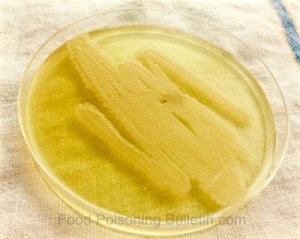A study presented at the American Society for Microbiology general meeting last week in Denver, Colorado looked at the possibility that healthy gut bacteria could prevent pathogenic bacterial infections. Scientists at the University of Michigan Medical School raised rodents in a completely sterile environment, then gave some of them a dose of probiotic bacteria. Then they were given doses of enterohemorrhagic E. coli O157:H7 (EHEC), which causes hemolytic uremic syndrome.
 The mice who received the probiotic bacteria did not get sick. The mice who did not receive the probiotics developed HUS within a week.
The mice who received the probiotic bacteria did not get sick. The mice who did not receive the probiotics developed HUS within a week.
Other studies have shown similar results. A study published in the journal GUT in 2003 found that live probiotics protect intestinal cells from infection of enteroinvasive Escherichia coli (EIEC) bacteria.
Scientists found that probiotics enhance the barrier function of cells that have not yet been exposed to the pathogen. The good bacteria may also interfere with pathogen adhesion and invasion. Another study published in Infection and Immunity in 2010 found that probiotic bacteria reduces “both the binding and internalization of adherent, invasive E. coli strains.”
Probiotic bacteria include Lactobacillus reuteri, Bifidobacterium animalis, and Lactobacillus acidophilus, among others. There is strong evidence that probiotic bacteria can treat acute diarrhea and antibiotic-associated diarrhea. Scientists think probiotic bacteria could be used to help treat childhood respiratory infections, tooth decay, ulcerative colitis, and inflammatory bowel disease. But not everyone should take these bacteria. Patients with severe pancreatitis who consume probiotics have a higher risk of death.
Probiotics are found in yogurt, kefir, miso, kimchi, and sauerkraut. These beneficial bacteria are also available as dietary supplements.




